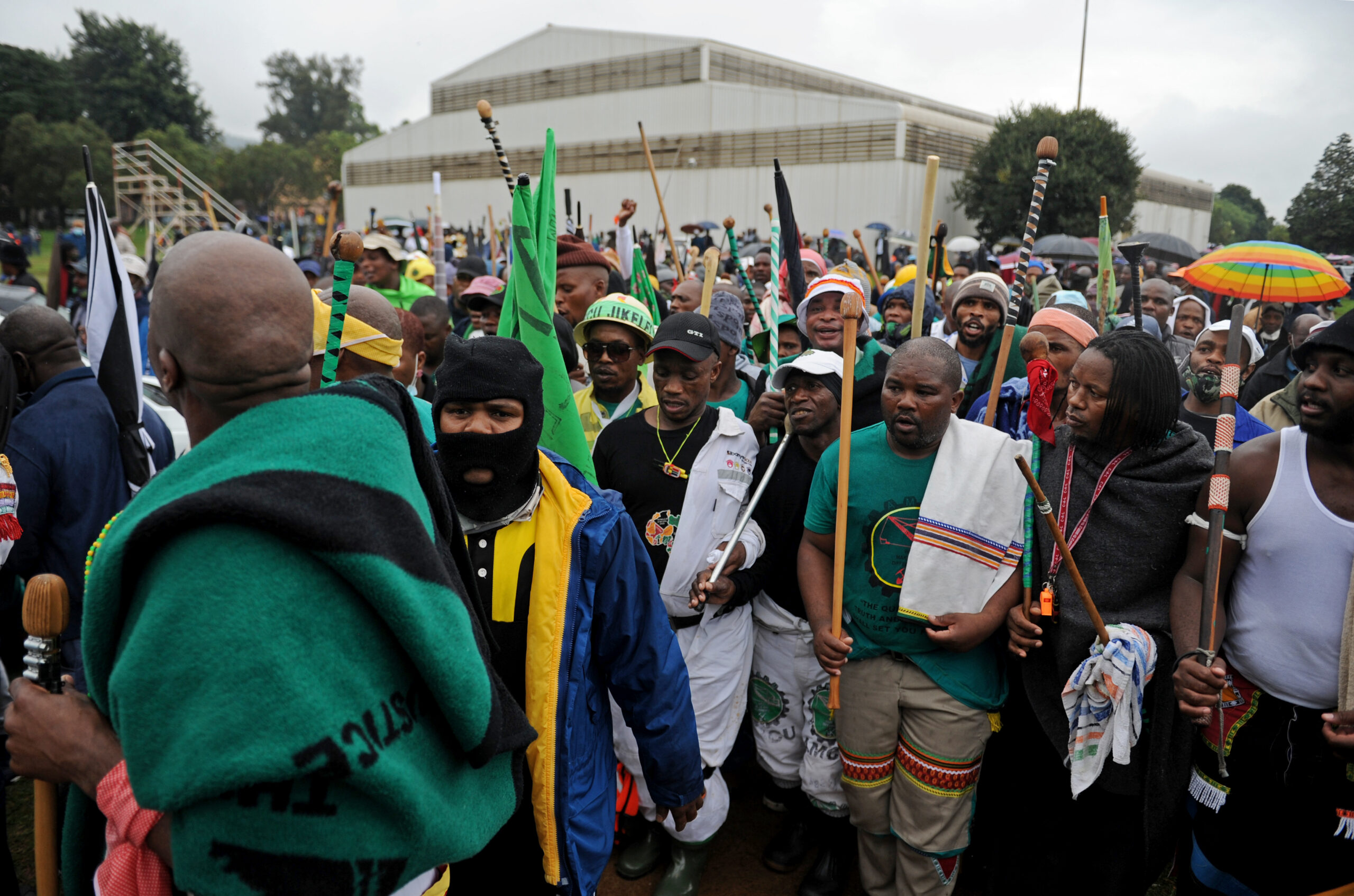The CCMA has already received more than 160 000 cases related to Covid and vaccine mandate-related disputes.

Striking members of the Association of Mineworkers and Construction Union (Amcu) and National Union of Mineworkers (NUM) at Sibanye-Stillwater gold mine gather at Driefontein site for a mass meeting on 9 March 2022. Photo: Gallo Images/City Press/Tebogo Letsie
The Commission for Conciliation, Mediation and Arbitration (CCMA) is getting ready to tackle the upcoming wave of strikes, as unions’ with big wage demands and employers lock horns in a depressed economy.
The number of cases referred to the CCMA declined dramatically as the Covid pandemic and lockdowns persisted in the past two years. However, with the less restricted resumption of economic activities, referrals are on the rise.
CCMA branches across the country opened offices again on 1 May 2022, allowing walk-ins after the relaxation of Covid-19 restrictions last month.
Briefing the National Council Of Provinces (NCOP) select committee labour and economic development, Employment and Labour Minister Thulas Nxesi said the CCMA’s dispute resolution mechanisms are expected to be rolled in to resolve upcoming labour disputes.
“I know honourable members may be worried about new waves of strike… It is that period of bargaining in labour market again and we use the CCMA if matters are not getting resolved.
“There are workplace dispute resolution mechanisms but where its necessary, we jump in. It is that period of bargaining where we expect tensions to rise across economic sectors.
Strikes already raging in several industries
At the forefront of workers making unmet demands is Sibanye Still-Water, where employees downed tools more than two months ago, demanding an increase of R1 000 a month. The gold mining company is offering R850 each year for three years.
Disputes at steel manufacturer AcelorMittal plants across the country rage on after the Labour Court dismissed the company’s application to interdict their workers’ strike.
In the public sector, employees at revenue collector the SA Revenue Services (Sars) are holding lunchtime pickets.
Unions Nehawu (National Education, Health and Allied Workers Union) and the PSA (Public Servants Association of SA) are demanding 12% increases, which the employer says is unaffordable.
Civil servants, nurses and teachers have tabled a 10% pay hike and a R2500 housing allowance, which are reportedly expected to cost the national kitty over R40 billion if implemented.
On average, the CCMA deals with 4000 wage and strike-related disputes every year, according to senior commissioner Setlaga Morwa.
ALSO READ: Numsa intensifies strike at ArcelorMittal
Referred CCMA disputes in numbers
The commission received 11 653 cases last month alone.
Between April 2020 when Covid hit and end April 2022, there were 168 538 Covid and vaccine mandate-related disputes received.
“In the same period, 601 of the 99 219 unfair dismissal cases received were Covid-related. About 204 were linked to mandatory vaccination. We thought it would make case management easier to separate Covid and vaccine-related cases from the rest of the cases,” Morwa told the MPs.
Between 2020 and April 2022, large scale retrenchments undertaken by big companies resulted in 434 599 employees affected, facing joblessness. Morwa said there was a spike in job losses during Covid-19, peaking at 60% increase.
“The CCMA can only report on matters referred to it, this by no means provides a comprehensive picture of total job losses in the market. Some of the cases, as we all know, are not referred to us.
“Through our interventions and workplace resolution mechanisms, we’ve been able to save 40% on average of jobs in retrenchment cases. In 2020, we had 1 124 large scale retrenchment referrals, affecting 138 816 employees. We saved at least 58 165 jobs… We’ve been consistent at around 40% average in contributing to saving job losses in the labour market,” he said.
Budget cuts have forced the CCMA to use virtual platforms in its work, enabling it to save on transport and venue hiring costs.
Companies, especially SMMEs, receive training and guidance on dispute resolution and mediation from the CCMA, a method that Morwa says has resulted in some matters being resolved without involving the CCMA.
“Currently, other than the Sibanye Still-Water gold strike, we are able assist others with conciliation and mediation. The challenges are on union rivalries.
“New unions’ approach to employees is based on ‘new members at all costs,’ and sometimes results in unreasonable demands that are hard to deliver, and in the process, unnecessary strikes ensue. There’s lack of understanding sometimes on how the law works.”
The department’s director-general Thobile Lamati bemoaned the ineffectiveness of the Department of Justice and Correctional Services’ sheriffs to implement CCMA arbitration awards , often made in favour of an employee.
Where the employer fails to comply with the arbitration award, sheriffs are reluctant to seize employers’ goods to enable the payment of the employee.
“I think the suggestion that minister engage on this with his counterpart at the department of justice is the right course, because previously at some point, the CCMA didn’t have money to enforce awards. We have been collecting money and handed it to the commission to have the awards enforced.
“It’s a very difficult thing if the sheriffs don’t want to play game. If it was the CCMA not able to pay them, then it would be something else, but that has since been taken care of,” Lamati said.
NOW READ: Sibanye Stillwater locks out striking workers and halts operations
Download our app




